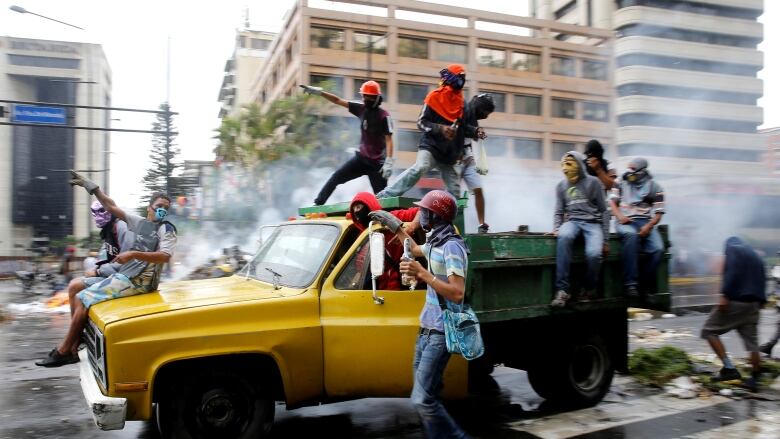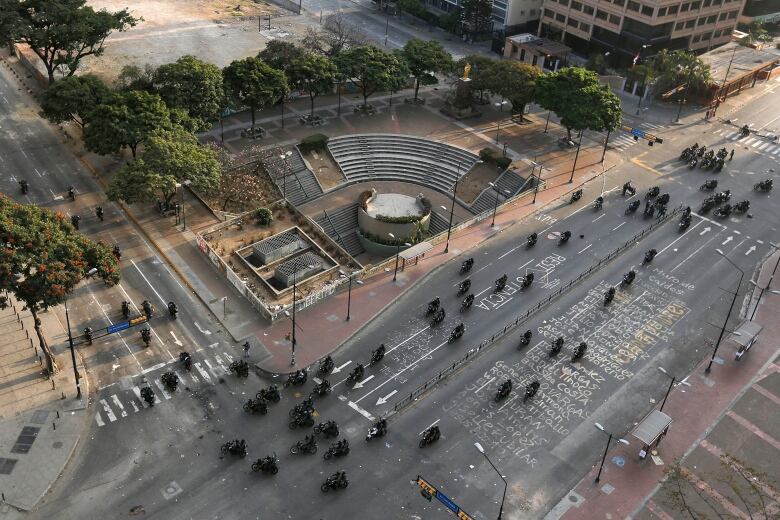Blackouts, gas bombs and gunplay: How the Canadian embassy is holding on in Venezuela
'Theres a reason that the U.S. sometimes acts ... like its blind and deaf' - former ambassador Ben Rowswell

The United States signed an accord yesterday that will allow for a U.S. "interests section"in the Swiss embassy in Caracas, the same arrangement it has had in Tehran for the past 40 years.
The U.S. began pulling its diplomats from its embassy in Venezuelain January and the last left in mid-March.
The Canadians, however, remain entrenched in their five-storey embassy on the corner ofAltamiraSquare, with no plans to go anywhere.
"I'm glad that Canada didn't do the same thing as the U.S. because you need people on the ground in places like Venezuela to get a sense of what the citizens are saying," said BenRowswell,the last person to serve as a full ambassador for Canada in Caracas.
"There's a reason that the U.S. sometimes acts in foreign policy like it's blind and deaf, and that's because it actually ends up removing its eyes and ears from the places that matter the most, like Caracas.
"The core function of diplomacy is listeningand that's one thing our embassy excelled at. The embassy has probably had face-to-face conversations with tens of thousands of Venezuelans of every stripe over these past few years and that's one of the reasons we're so confident in our judgments of what Venezuelans really want."
Live and let live
Canadian officials and their Venezuelan counterparts both the ones who support current President Nicols Maduro and those backing opposition leader Juan Guaid have described a strange diplomatic equilibrium that allows Canada's embassy to remain in Caracas despite government orders to leave, and also lets Maduro's government retain six diplomatic properties in Canada, despite the fact that Ottawa doesn't recognize it.
"I have an accreditation issued by the government of Canada as a diplomat in this country," Prof. Luis Acuna Cedeno told CBC News.
Acuna, a PhD graduate of the University of Western Ontario, was a cabinet minister under President Hugo Chavez and served as governor of Sucre state under Nicolas Maduro. Today, he runs Venezuela's embassy in Sandy Hill, Ottawa, with the title of "charg d'affaires."
"The diplomatic mission of the Bolivarian Republic of Venezuela has its staff working at the embassy in the city of Ottawa, the general consulate of Montreal, the general consulate of Vancouver and the general consulate of Toronto. The Bolivarian Republic of Venezuela does not have any other diplomatic staff working in Canada," he explained.
Meanwhile, the man Canada does recognize as Venezuela's legitimate representative,Orlando Viera Blanco, is unable to set foot in his country's embassy or official residence. He's also barred from becoming a diplomat in Canada because of his immigration status as a Canadian permanent resident.
Viera Blanco told CBC News he plans to renounce his permanent resident status. "We are in the process, just to respect the protocols, and to improve our final status as an ambassador. The Vienna Convention requires us not to be a citizen or a permanent resident."
Viera Blanco said he's also unable to visit the nation he represents because he faces a criminal charge of treason for accepting the post of representative for the man Canada has recognized as Venezuela's acting president, Juan Guaid.
The unusual modus vivendi the parties described to CBC News appears to have endured because for the moment it works for the two governments.
Canada's toleration of the presence of two rival representatives from Venezuela is a pragmatic quid pro quo for Venezuela's tolerance of the Canadian diplomatic presence in Caracas.
"It's an unprecedented situation. When you have people from Canada working in Venezuela, you have to be prudent," says Viera Blanco. Partly for that reason, he told CBC News, taking possession of Venezuela's diplomatic properties in Canada is a "low priority."
"We respect the uniqueness of that situation and that's why we have to move forward with diplomacy, prudence and moderation."
The situation stands in sharpcontrast to that of some of the other key players in the fight over Venezuela's future, who have been unable to maintain a diplomatic presence in Venezuela.
'Get back, Satan!'
"I have decided to break all political and diplomatic relations with the fascist government of Colombia and all its ambassadors and consuls must leave Venezuela within 24 hours. Get out of here, oligarchy!"
With those words on Feb.23, Maduro announced the end of all ties with the country many Venezuelans refer to as their "sister nation."
"You are the devil,Ivn Duque, you're the devil," Maduro said, referring to theColombian president. "And you're going to dry up for interfering in Venezuela. Get back Satan, get out of here devil!"
For six weeks now, the border has been closed between two countries that were, for the first 12 years of their independence, a single nation.
Colombia and Venezuela have since engaged in a war of words that occasionally has spilled over into border clashes, pitting the Colombian military against shadowy paramilitary groups that Bogota considers to be protegs of the Maduro government.
Colombia also has lost the ability to help its citizens in Venezuela, where they are by far the largest group of foreign residents.

U.S. throws in the towel
On March 11, just hours after a State Department briefing on Venezuela that made no mention of closing the U.S. embassy, Secretary of State Mike Pompeo surprised many with a late-night tweet from Texas in which he announced that Washingtonwould be pulling out.
The U.S. will withdraw all remaining personnel from @usembassyve this week. This decision reflects the deteriorating situation in #Venezuela as well as the conclusion that the presence of U.S. diplomatic staff at the embassy has become a constraint on U.S. policy.
—@SecPompeoThe breakdown began on Jan.23,when the U.S. and Canada joined several Latin American countries in recognizing Guaid as acting president. The next day, theMadurogovernment gave the U.S. embassy 72 hoursto either withdraw its recognition ofGuaidor withdraw its diplomats.
The U.S. ordered non-essential diplomats and all family members out of Venezuela, but said it would not comply with an order from a Maduro-led government it no longer considered legitimate.
Maduro's governmentissued a face-saving 30-day extension, which it renewed for 30 days in February, to allow the U.S. to set up an interests section in another country's embassy, and the last diplomat departed on March 14.
Gas, blackouts and threats
Canada's embassy has stayed open despite logistical difficultiesincluding prolonged city-wide blackouts caused by the collapse of Venezuela's electricity network by running diesel generators and stockpiling water.
Its location on Plaza Altamira has put it at the heart of numerous protests, some of which have ended in gunfire, injuries and deaths.
"When the police forces would enter the square to try to clear it, that would create a situation of tension in the plaza," saidRowswell.
"There were some times when there were particularly intense protests or repression and we would have to suspend some of our public-facing operation such as providing consular service for a day or two, but we would get right back into action very quickly."
PNB le lanz una lacrimgena a la embajada de Canad en Altamira 14:20 pic.twitter.com/MRdiNxkXBs
—@sinceptoWhenRowswellfinished his term as ambassador, the Venezuelan government refused to allow him to be replaced, as it had been angered by Magnitsky Act sanctions brought against certain members of theMaduroregime. The next-ranked diplomat, Craig Kowalik, took over as charg d'affaires.
He lasted about six months before learning from social media that he had just been declared persona non grata along with the Brazilianambassador. Both had to leave, and today Kowalik is in Colombia.
Diplomats in Caracas have grown used to a steady stream of denunciations, including trips to the Venezuelan foreign ministry to receive protest notes.
#PHOTOS | Charg d'Affaires of Canada, Lori Corrivean, receives from Minister Jorge Arreaza the Note of Protest which rejects the interference in internal affairs of Venezuela#YoJuroConMaduro pic.twitter.com/FHJ6Yq69ws
—@MFAVenezuelaIn a typical statement on May 30, 2018, Venezuela's foreign minister Jorge Arreaza suggested that Canada's criticisms were prompted by its desire to maintain NAFTA:
"It is blindingly obvious that the obsessive conduct of the government of Canada against Venezuela results from its humiliating subordination to the foreign policy of the racist and supremacist administration of Donald Trump. The facts suggest that this servile policy of the Canadian authorities is the product of the desperation of that government to avoid losing benefits and preferences in its commercial treaties with the United States."
Ultimatum ignored
As well as surviving downgrades and expulsions, the Canadian embassy managed to ride out one ultimatum to close up shop by simply ignoring it.
On Jan.9, the Venezuelan government gave Canada 72 hours to retract a statement saying that Maduro, whose presidential term had ended that day, was no longer a legitimate president. If Canada did not retract, Venezuela would break off relations.
Canada did nothing.
On the Saturday the deadline was to expire, Venezuela's foreign ministry announced that President Maduro had decided to extend the deadline for Canada (and fellow miscreant Paraguay) to the following Monday.
#VIDEO | Canciller Arreaza: El Pdte.@NicolasMaduro ha instruido extender el plazo de espera a la Repblica del Paraguay y Canad para que rectifiquen#VenezuelaConMaduro #VenezuelaSeRespeta pic.twitter.com/tBbKjyQDpT
—@CancilleriaVEAgain, Canada did nothing. The Monday came and went with no consequences.
Paraguay responded to the threat by closing its embassy and breaking off relations.
'Performing for the cameras'
"(Members of the Maduroregime) are aware of how isolated they are," said Rowswell, "and they sometimes lash out in anger in ways that aren't entirely thought through. And they're sometimes performing for the cameras, and not engaged in real conversations. Often you'll see them making a threat on television without ever having communicated with the embassy.
"My experience was you never knew who they were going to pick on. You'd wake up one day and it would be the Italians, the next day it would be the Spanish, almost every day (it) would be the United States, and then regularly every single Latin American country would be singled out for abuse.
"It got to the point there was no observable pattern, just whoever Maduro was mad at from one day to the next."
On March 4, Guaid returned to Caracas after a tour of South American capitals, during which he was ftedby the presidents of Argentina, Brazil, Chile and Colombia as the legitimate president of Venezuela.
Fearing that he would be arrested, diplomats from several countries, including Canada, went to the airport to greet him. Venezuela responded by giving German Ambassador Daniel Kriener 48 hours to leave the country, which he did.
Again, the Canadians escaped a sanction.
Rowswell said he hopes this unusual situation can be maintained, even though it rests on shaky diplomatic ground.
"Once you remove Canadian diplomats, over time the kind of granular feel we have for what is really happening on the ground would diminish. And that's where I feel the Americans are really making a big mistake by losing their eyes and ears on the ground."












_(720p).jpg)


 OFFICIAL HD MUSIC VIDEO.jpg)
.jpg)



























































































